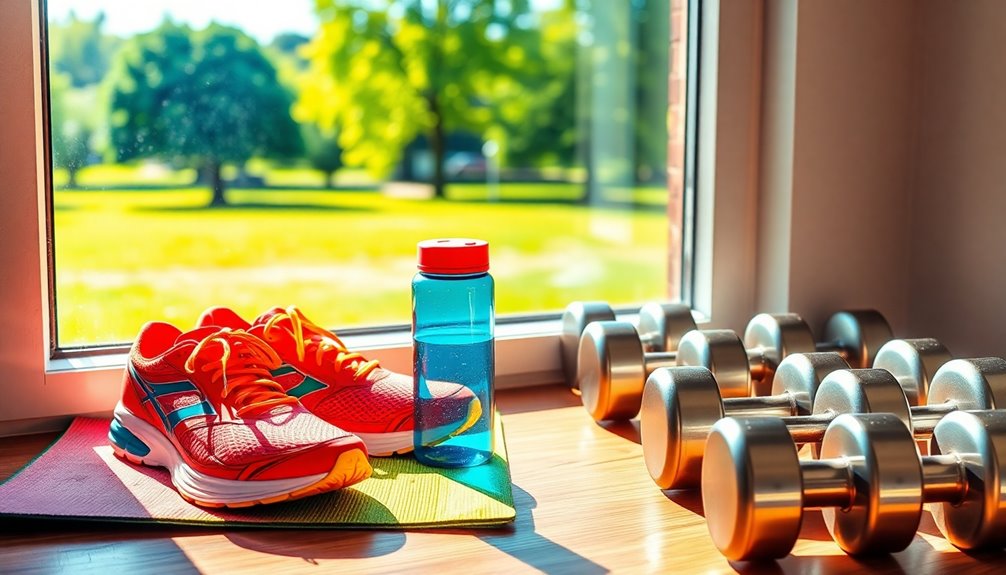To start a healthy lifestyle, begin by acknowledging your unhealthy habits and setting realistic, achievable goals. Incorporate more fruits, vegetables, and whole grains into your diet while aiming for at least 150 minutes of exercise weekly. Stay hydrated by drinking 6 to 8 glasses of water daily and prioritize sleep for overall well-being. Remember, it's normal to face setbacks, but using positive self-talk can help you stay motivated. Stick around to discover more tips for your journey.
Key Takeaways
- Acknowledge and identify unhealthy habits to motivate meaningful changes towards a healthier lifestyle.
- Set small, realistic goals, like incorporating more fruits and vegetables into your diet daily.
- Start an exercise routine with moderate activities, aiming for 150 to 300 minutes per week.
- Prioritize mental health by engaging in enjoyable activities and practicing relaxation techniques.
- Expect setbacks, viewing them as opportunities for growth, and seek support from friends or community.
How to Begin Your Journey to a Healthy Lifestyle

Starting your journey to a healthy lifestyle can feel intimidating, but by breaking it down into manageable steps, you can set yourself up for success.
First, acknowledge your unhealthy habits; understanding why you want to change is key. Next, set small, realistic goals for eating nutrient-dense foods that align with physical activity guidelines, like aiming for 150 minutes of regular exercise each week.
Focus on creating a balanced diet by gradually incorporating more fruits, vegetables, and whole grains while limiting processed foods. Consider starting your day with a healthy breakfast that includes a balance of protein, fiber, and healthy fats to fuel your morning.
Don't forget about your mental health—engage in relaxation techniques and activities you enjoy.
Tracking your progress weekly will help maintain accountability and motivation as you develop these healthy habits, paving the way for lasting change.
The Importance of Setting Realistic Goals

When it comes to adopting a healthy lifestyle, setting realistic goals is essential for maintaining motivation and focus. Achievable goals, like walking for 10 minutes a day, help you stay committed to your journey. By tracking progress weekly, you hold yourself accountable and can celebrate small victories that lead to lasting lifestyle changes. Gradually adding new goals once you've established initial ones prevents feelings of being overwhelmed and promotes long-term adherence to healthy habits. Research shows that individuals who set specific measurable goals are more likely to succeed. Additionally, incorporating regular physical activity into your routine can significantly enhance your overall health and well-being.
| Goal Type | Example |
|---|---|
| Short-term Goals | Walk 10 mins daily |
| Medium-term Goals | Exercise 3 times a week |
| Long-term Goals | Run a 5K in 6 months |
Enhancing Your Mental Health and Happiness

Enhancing your mental health and happiness is essential, as a positive mindset can transform your overall well-being.
Prioritizing activities you enjoy, like hobbies or socializing, can greatly boost your happiness and reduce stress. Incorporating relaxation techniques, such as mindfulness or meditation, helps improve emotional well-being and manage anxiety.
Practice positive self-talk to build self-confidence and resilience, allowing you to cope better with life's challenges. If you're struggling, don't hesitate to seek professional support through therapy, which can provide effective coping strategies and emotional regulation. Additionally, embracing a growth mindset can empower you to view challenges as opportunities for personal development.
Starting an Exercise Routine

Starting on an exercise routine can feel intimidating, but breaking it down into manageable steps makes it easier to achieve your fitness goals.
Begin with small actions, like walking for at least 30 minutes three times a week, to gradually build your fitness level and avoid burnout. Aim for a weekly goal of 150 to 300 minutes of moderate-intensity exercise to enjoy various health benefits. Incorporating activities like hula hooping for weight loss can make your workouts more enjoyable and engaging.
Schedule specific times for physical activity to create consistency in your routine. Incorporate a mix of cardiovascular, strength, and flexibility exercises for a balanced workout.
Finally, consult with a doctor before starting a new exercise program, especially if you're over 45 or have pre-existing health conditions, to guarantee safety and suitability for your needs.
Building Healthy Eating Habits

Building healthy eating habits is essential for fueling your body and supporting your overall well-being.
Start by aiming for at least 5 portions of a variety of fruits and vegetables daily—each portion should be around 80g for fresh, canned, or frozen options. Incorporate whole grains and legumes, making them just over a third of your daily food intake.
Limit free sugars to no more than 5% of your caloric intake, roughly 30g for adults. Prioritize water as your main beverage, targeting 6 to 8 glasses daily to stay hydrated.
Keep your saturated fat intake below 30g for men and 20g for women, while opting for healthy unsaturated fats found in vegetable oils and lean meats.
Maintaining a Healthy Weight

Maintaining a healthy weight is essential not just for looking good but for reducing the risk of serious health issues like heart disease and diabetes.
Focus on a balanced diet rich in nutrient-dense foods while minimizing processed foods. Regular physical activity is vital for effective weight management. Additionally, incorporating low carb foods can support your weight loss journey by reducing cravings and boosting energy levels.
Use Body Mass Index (BMI) and waist circumference as useful metrics, but remember that individual metabolism and lifestyle play significant roles.
Collaborate with a healthcare provider for personalized guidance tailored to your unique circumstances. Tracking your progress and setting realistic goals can help sustain your healthy weight over time, encouraging accountability and gradual lifestyle changes.
Embrace this journey, and you'll feel better both physically and mentally.
Staying Hydrated and Its Benefits

Hydration plays an essential role in your overall health and well-being, with experts recommending you drink between 8 to 13 cups of water daily. Staying hydrated helps improve digestion, boosts energy levels, and enhances cognitive function, all of which contribute to your mood and concentration.
When you drink water, you support your body's temperature regulation and joint health, allowing you to enjoy the benefits of exercise more fully. Dehydration can lead to fatigue, irritability, and decreased performance, making consistent fluid intake vital.
Additionally, choosing water over sugary drinks can aid in weight management, as those calories can increase the risk of obesity and related health issues.
Prioritize water in your diet and exercise for ideal health and wellness.
The Role of Sleep in a Healthy Lifestyle

While you might prioritize diet and exercise in your quest for a healthy lifestyle, don't overlook the critical role sleep plays in your overall well-being.
Quality sleep is essential for recovery, hormone regulation, and mental clarity. Chronic sleep deprivation can lead to serious health issues, including cardiovascular disease and diabetes. Effective time management can also contribute to better sleep by reducing stress and creating a more organized daily routine.
To enhance your sleep quality, consider these health habits:
- Establish a consistent sleep schedule
- Create a restful environment
- Limit screen time before bed
- Aim for 7 to 9 hours of sleep
- Prioritize relaxation techniques
Overcoming Obstacles and Staying Motivated

As you commence your journey to a healthier lifestyle, you'll likely encounter obstacles that can challenge your commitment. Identify specific hurdles like time constraints or emotional triggers, and develop strategies to tackle them.
Set small, achievable goals, celebrating each milestone to keep your motivation high. Progress tracking is key—monitor your advancements weekly to enhance accountability.
Surround yourself with supportive individuals who share your health goals; social support markedly boosts adherence to lifestyle changes.
Expect setbacks, but use positive self-talk to reframe these challenges as opportunities for growth. Additionally, understanding the importance of secure attachment bonds can strengthen your relationships, providing a solid foundation for your health journey.
Frequently Asked Questions
How Do You Start Living a Healthy Lifestyle?
To start living a healthy lifestyle, you'll want to identify your unhealthy habits and what triggers them.
Set realistic, specific goals and track your progress weekly to stay motivated. Incorporate regular physical activity, aiming for 150–300 minutes of moderate exercise each week.
Focus on nourishing your body with a balanced diet, rich in fruits, vegetables, and lean proteins.
Finally, prioritize your mental health through positive self-talk and engaging in activities you enjoy.
What Is the Healthiest Daily Routine?
Imagine your body as a well-tuned machine; it needs the right fuel and care.
To establish the healthiest daily routine, you'll want to incorporate 150–300 minutes of exercise each week. Prioritize 7 to 9 hours of quality sleep, enjoy a nutritious breakfast, and drink 6 to 8 glasses of water daily.
Don't forget to carve out time for relaxation and enjoyable activities, allowing you to manage stress and maintain balance in your life.
What Does a Healthy Lifestyle Start With?
A healthy lifestyle starts with a balanced approach to your nutrition. Focus on incorporating a variety of nutrient-dense foods like fruits, vegetables, whole grains, lean proteins, and healthy fats into your meals.
Setting realistic and achievable goals can make a significant difference; think small and specific.
Don't forget about regular physical activity, aiming for at least 150 minutes of moderate exercise each week to keep your body and mind in top shape.
How Do I Fix My Unhealthy Lifestyle?
To fix your unhealthy lifestyle, start by identifying specific habits you want to change, like cutting back on sugar or moving more.
Set realistic goals, such as walking for 30 minutes three times a week.
Track your progress weekly to stay accountable and adjust your goals as you improve.
Remove triggers that lead to unhealthy choices, and consider seeking support from professionals for personalized guidance.
This way, you'll make lasting changes more effectively.
Conclusion
To sum up, starting a healthy lifestyle isn't just about following a strict diet or hitting the gym daily—it's a holistic approach that balances physical, mental, and emotional well-being. You might've heard that it takes 21 days to form a habit, but recent studies show it can take much longer. So, be patient with yourself. Embrace small changes, stay committed, and remember that every step you take toward a healthier you is worth celebrating. Keep going!









